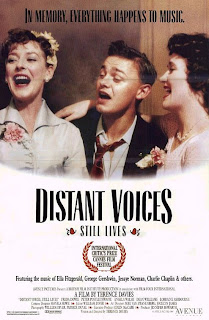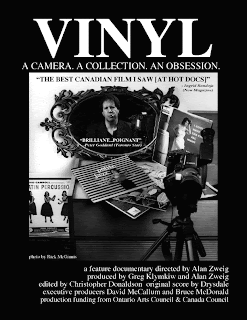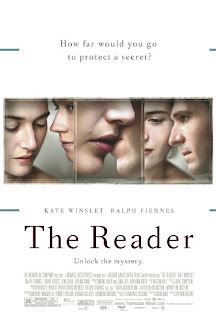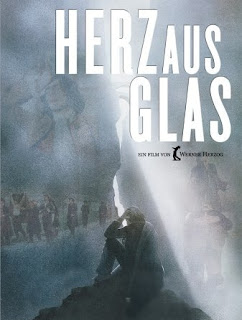Cinematheque: Distant Voices, Still Lives (Davies, 1988)
 I want to like this more than I do. What started out as a mesmerizing, beautiful arrangement of memories that flowed onto the screen in the same manner that memories cycle through one’s brain dissolved into a tedious sequence of sing-alongs that frustrated me and pulled me out of the film’s spell. It is the best Davies film that I have seen, though (I like it more than his Trilogy and his recent Of Time and the City), but I’m starting to think that he isn’t for me. His work is undeniably well crafted, and his use of pop music is first class. But it wears thin, and it hasn’t kept my attention for an entire feature yet. The filmmaking, though, is poetic, nostalgic, and occasionally very moving. One of the most powerful moments of this film for me was in the transition from Distant Voices into the Still Lives half. A scene at a fireplace fades to black, and then, a phenomenon that can only be experienced when watching this projected on film, the dust on the negative mixes, and is absorbed by, the reflections in a pitch black body of water, all while the sound of a woman giving birth fades in to interrupt the beauty of the image. It’s a brilliant transition, but it also mirrors the formal construction of the film, in which the crooning women never stop singing, interrupting the stunning everything that was Distant Voices. But I look at the poster now, and I see the tagline “In memory, everything happens to music.” Its a tacky way to try to sell this film; I think it preps audiences for something more in line with Meryl Streep’s Music of the Heart. It does make me reconsider Davies’ intentions, though. While I felt the influence of musicals on this film, I wonder if he was trying to make a musical. The film certainly evolves that way. Its interesting to know that the film is a parade of his own memories, and it is telling about him as a person and the circumstances in which he grew up in that these sing-alongs are what he remembers most, rather than all of the misery. There is a lot of misery in this film, but I wouldn’t call it miserable. I felt a lot of joy in watching it, and I got the impression that everyone in this family, despite how rocky things were, could keep loving each other no matter what, and could always see optimism in the future. The film has tons of good ideas and huge emotion, I just wish it all gelled a bit better for me.
I want to like this more than I do. What started out as a mesmerizing, beautiful arrangement of memories that flowed onto the screen in the same manner that memories cycle through one’s brain dissolved into a tedious sequence of sing-alongs that frustrated me and pulled me out of the film’s spell. It is the best Davies film that I have seen, though (I like it more than his Trilogy and his recent Of Time and the City), but I’m starting to think that he isn’t for me. His work is undeniably well crafted, and his use of pop music is first class. But it wears thin, and it hasn’t kept my attention for an entire feature yet. The filmmaking, though, is poetic, nostalgic, and occasionally very moving. One of the most powerful moments of this film for me was in the transition from Distant Voices into the Still Lives half. A scene at a fireplace fades to black, and then, a phenomenon that can only be experienced when watching this projected on film, the dust on the negative mixes, and is absorbed by, the reflections in a pitch black body of water, all while the sound of a woman giving birth fades in to interrupt the beauty of the image. It’s a brilliant transition, but it also mirrors the formal construction of the film, in which the crooning women never stop singing, interrupting the stunning everything that was Distant Voices. But I look at the poster now, and I see the tagline “In memory, everything happens to music.” Its a tacky way to try to sell this film; I think it preps audiences for something more in line with Meryl Streep’s Music of the Heart. It does make me reconsider Davies’ intentions, though. While I felt the influence of musicals on this film, I wonder if he was trying to make a musical. The film certainly evolves that way. Its interesting to know that the film is a parade of his own memories, and it is telling about him as a person and the circumstances in which he grew up in that these sing-alongs are what he remembers most, rather than all of the misery. There is a lot of misery in this film, but I wouldn’t call it miserable. I felt a lot of joy in watching it, and I got the impression that everyone in this family, despite how rocky things were, could keep loving each other no matter what, and could always see optimism in the future. The film has tons of good ideas and huge emotion, I just wish it all gelled a bit better for me.
Cinematheque: Distant Voices, Still Lives (Davies, 1988) Read More »


.jpg)






